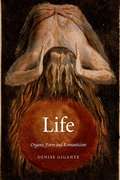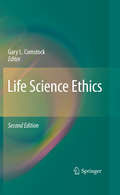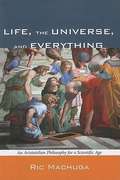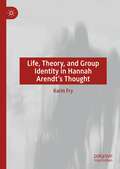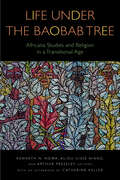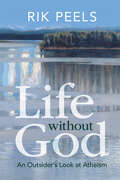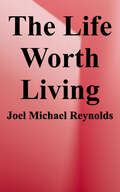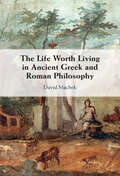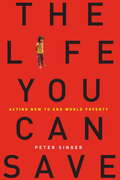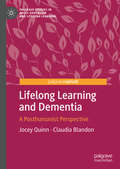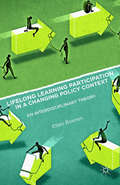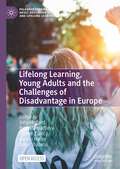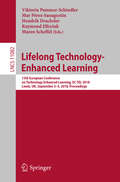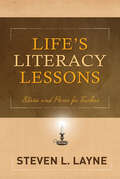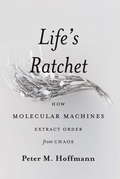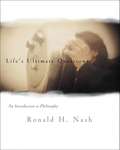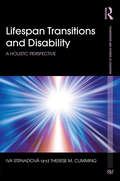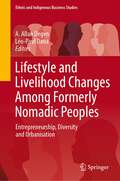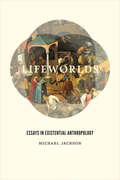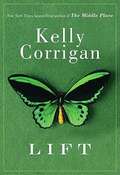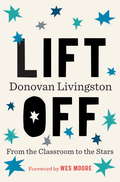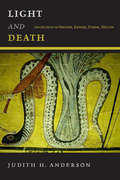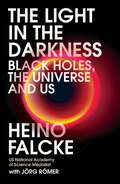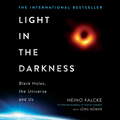- Table View
- List View
Life Organic Form And Romanticism
by Denise GiganteWhat makes something alive? Or, more to the point, what is life? The question is as old as the ages and has not been (and may never be) resolved. Life springs from life, and liveliness motivates matter to act the way it does. Yet vitality in its very unpredictability often appears as a threat. In this intellectually stimulating work, Denise Gigante looks at how major writers of the Romantic period strove to produce living forms of art on an analogy with biological form, often finding themselves face to face with a power known as monstrous. The poets Christopher Smart, William Blake, Percy Bysshe Shelley, and John Keats were all immersed in a culture obsessed with scientific ideas about vital power and its generation, and they broke with poetic convention in imagining new forms of "life. ” In Life: Organic Form and Romanticism, Gigante offers a way to read ostensibly difficult poetry and reflects on the natural-philosophical idea of organic form and the discipline of literary studies.
Life, Organisms, and Human Nature: New Perspectives on Classical German Philosophy (Studies in German Idealism #22)
by Luca Corti Johannes-Georg SchüleinThis collection of essays investigates the notions of life, living organisms, and human nature in Classical German Philosophy from a historical and conceptual perspective. Its 19 chapters move from the peculiarities of organic life to the peculiarities of the distinctly human life form and discuss the strengths and weaknesses of naturalistic accounts of life. In light of the growing interest in nature within current philosophical debates, the book provides an overview of what the philosophical epoch of Kant, Fichte, Schelling, Humboldt, the Romantics, Hegel, and others can contribute to our understanding of life today. The collection of essays represents a plurality of approaches that reflects the pluralism of the tradition itself – highlighting the liveliness and polyphonic nature of the issues at stake and the ways in which they were approached in post-Kantian thought.In combining historical and philosophical investigation, the collection constitutes a unique resource for scholars and graduate students working in various areas related to the study of nature in philosophy, contemporary theories of science, and the humanities more generally.
Life Science Ethics
by Gary L. ComstockDoes nature have intrinsic value? Should we be doing more to save wilderness and ocean ecosystems? What are our duties to future generations of humans? Do animals have rights? This revised edition of "Life Science Ethics" introduces these questions using narrative case studies on genetically modified foods, use of animals in research, nanotechnology, and global climate change, and then explores them in detail using essays written by nationally-recognized experts in the ethics field. Part I introduces ethics, the relationship of religion to ethics, how we assess ethical arguments, and a method ethicists use to reason about ethical theories. Part II demonstrates the relevance of ethical reasoning to the environment, land, farms, food, biotechnology, genetically modified foods, animals in agriculture and research, climate change, and nanotechnology. Part III presents case studies for the topics found in Part II.
Life, the Universe, and Everything: An Aristotelian Philosophy for a Scientific Age
by Ric MachugaHas modern science made philosophy obsolete? Is the soul real? Do we have a free will? Why should we be moral? Does God exist, and if so, why is there so much pain and suffering in the world? What is the relation between faith and reason? - Ric Machuga takes a holistic approach to these questions. No philosophical idea, no matter how small, can live alone. Ideas always gain their force, power, and life from their surroundings--their "ecosystem." The ecosystem of ideas defended in this book comes from the ancient Greek philosopher Aristotle and his medieval interpreter, Thomas Aquinas. The ongoing relevance of their philosophical thought to twenty-first century issues is opened up in fascinating ways. Life, the Universe, and Everything is the product of thirty years of teaching introductory courses in philosophy. Assuming no prior background, it only requires of readers an enquiring mind and a willingness to think carefully. An ideal guide to the big questions we face.
Life, Theory, and Group Identity in Hannah Arendt's Thought
by Karin FryPhilosophy typically ignores biographical, historical, and cultural aspects of theoriss’ lives in an attempt to take a supposedly abstract and objective view of their work. This book makes some new conclusions about Arendt’s theory by emphasizing how her experience of the world as displayed in her archival materials impacted her thought. Some aspects of Arendt’s life have been examined in detail before, including the fact she was stateless as well as her affair with Heidegger. Instead, this work explores different topics including the biographical and narrative moments of Arendt's own work, the role of archiving in her thought, pivotal events that have not been archived, her understanding of her own identities, and how it affected the role of identity politics in her work. Typically, group action is underemphasized in Arendt scholarship in comparison to individual action and often identity politics questions are considered to lie within the realm of the private. Although Arendt’s theory is problematic when discussing issues concerning identity politics, she did think identity politics could be public and political and that effective political actions may occur within groups. What makes this project unique are the innovative conclusions made by moving the archival and biographical evidence to the center in order to understand her theory more accurately and within its historical and cultural context. This volume will be of interest to professional scholars in Arendt’s work, but also to those who have a more general interest in her life and theory.
Life Under the Baobab Tree: Africana Studies and Religion in a Transitional Age (Transdisciplinary Theological Colloquia)
by Shola Adegbite An Yountae Desmond D. Coleman Salim Faraji Rachel E. Harding Minenhle Nomalungelo Khumalo Althea Spencer Miller Pamela Mordecai Rev Canon Hugh R. Page Jr. A. Paige Rawson Nimi Wariboko Sharon Kimberly Williams Catherine KellerLife Under the Baobab Tree: Africana Studies and Religion in a Transitional Age is a compendium of innovating essays meticulously written by early and later diaspora people of African descent. Their speech arises from the depth of their experiences under the Baobab tree and offers to the world voices of resilience, newness/resurrection, hope, and life. Resolutely journeying on the trails of their ancestors, they speak about setbacks and forward-looking movements of liberation, social transformation, and community formation. The volume is a carefully woven conversation of intellectual substance and structure across time, space, and spirituality that is quintessentially “Africana” in its centering of methodological, theoretical, epistemological, and hermeneutical complexity that assumes nonlinear and dialogical approaches to developing liberating epistemologies in the face of imperialism, colonialism, racism, and religious intolerance.A critical part of this conversation is a reconceptualization and reconfiguration of the concept of religion in its colonial and imperial forms. Life Under the Baobab Tree examines how Africana peoples understand their corporate experiences of the divine not as “religion” apart from its intimate connections to social realities of communal health, economics, culture, politics, environment, violence, war, and dynamic community belonging. To that end Afro-Pessimistic formulations of life placed in dialogic relation Afro-Optimism. Both realities constitute life under the Baobab tree and represent the sturdiness and variation that anchors the deep ruptures that have affected Africana life and the creative responses. The metaphor and substance of the tree resists reductionist, essentialist, and assured conclusions about the nature of diasporic lived experiences, both within the continent of Africa and in the African Diaspora.
Life without God: An Outsider's Look at Atheism
by Rik PeelsIn this book, Rik Peels explores atheism from a new perspective that aims to go beyond the highly polarized debate about arguments for and against God's existence. Since our beliefs about the most important things in life are not usually based on arguments, we should look beyond atheistic arguments and explore what truly motivates the atheist. Are there certain ideals or experiences that explain the turn to atheism? Could atheism be the default position for us, not requiring any arguments whatsoever? And what about the often-discussed arguments against belief in God—is there something that religious and nonreligious people alike can learn from them? This book explores how a novel understanding of atheism is possible – and how it effectively moves the God debate further. Believers and non-believers can learn much from Peel's assessment of arguments for and against atheism.
The Life Worth Living: Disability, Pain, and Morality
by Joel Michael ReynoldsMore than 2,000 years ago, Aristotle said: “let there be a law that no deformed child shall live.” This idea is alive and well today. During the past century, Supreme Court Justice Oliver Wendell Holmes Jr. argued that the United States can forcibly sterilize intellectually disabled women and philosopher Peter Singer argued for the right of parents to euthanize certain cognitively disabled infants. <p><p>The Life Worth Living explores how and why such arguments persist by investigating the exclusion of and discrimination against disabled people across the history of Western moral philosophy. The author argues that this history demonstrates a fundamental mischaracterization of the meaning of disability, thanks to the conflation of lived experiences of disability with those of pain and suffering. <p><p>Building on decades of activism and scholarship in the field, Reynolds shows how longstanding views of disability are misguided and unjust, and he lays out a vision of what an anti-ableist moral future requires. The Life Worth Living is the first sustained examination of disability through the lens of the history of moral philosophy and phenomenology, and it demonstrates how lived experiences of disability demand a far richer account of human flourishing, embodiment, community, and politics in philosophical inquiry and beyond.
The Life Worth Living in Ancient Greek and Roman Philosophy
by David MachekThe account of the best life for humans – i.e. a happy or flourishing life – and what it might consist of was the central theme of ancient ethics. But what does it take to have a life that, if not happy, is at least worth living, compared with being dead or never having come into life? This question was also much discussed in antiquity, and David Machek's book reconstructs, for the first time, philosophical engagements with the question from Socrates to Plotinus. Machek's comprehensive book explores ancient views on a life worth living against a background of the pessimistic outlook on the human condition which was adopted by the Greek poets, and also shows the continuities and contrasts between the ancient perspective and modern philosophical debates about biomedical ethics and the ethics of procreation. His rich study of this relatively neglected theme offers a fresh and compelling narrative of ancient ethics.
The Life You Can Save: Acting Now to End World Poverty
by Peter SingerThis is the right time to ask yourself: "What should I be doing to help?" For the first time in history, it is now within our reach to eradicate world poverty and the suffering it brings. Yet around the world, a billion people struggle to live each day on less than many of us pay for bottled water. And though the number of deaths attributable to poverty worldwide has fallen dramatically in the past half-century, nearly ten million children still die unnecessarily each year. The people of the developed world face a profound choice: If we are not to turn our backs on a fifth of the world's population, we must become part of the solution. In The Life You Can Save, philosopher Peter Singer, named one of "The 100 Most Influential People in the World" by Time magazine, uses ethical arguments, provocative thought experiments, illuminating examples, and case studies of charitable giving to show that our current response to world poverty is not only insufficient but ethically indefensible. Singer contends that we need to change our views of what is involved in living an ethical life. To help us play our part in bringing about that change, he offers a seven-point plan that mixes personal philanthropy (figuring how much to give and how best to give it), local activism (spreading the word in your community), and political awareness (contacting your representatives to ensure that your nation's foreign aid is really directed to the world's poorest people). In The Life You Can Save, Singer makes the irrefutable argument that giving will make a huge difference in the lives of others, without diminishing the quality of our own. This book is an urgent call to action and a hopeful primer on the power of compassion, when mixed with rigorous investigation and careful reasoning, to lift others out of despair.
Lifelong Learning and Dementia: A Posthumanist Perspective (Palgrave Studies in Adult Education and Lifelong Learning)
by Jocey Quinn Claudia BlandonThis book explores the potential for lifelong learning in dementia. A growing social issue, dementia has previously been understood as a wasteland for learning: at best, those with dementia are helped to hold on to some pre-existing skills. This book draws on extensive qualitative data with people with dementia and their families to demonstrate that new forms of learning can happen in dementia, with positive outcomes for both the learner and those around them. In doing so, this book demonstrates that those with dementia help us to understand learning differently, thus providing a breakthrough in our understanding and theorising of lifelong learning. Using posthuman theory to scaffold and discuss the findings, this pioneering book will appeal to scholars of dementia, lifelong learning and the posthuman.
Lifelong Learning Participation in a Changing Policy Context: An Interdisciplinary Theory
by Ellen BoerenDrawing on the role of individuals, education and training providers and countries' social policy actions, and borrowing insights from psychology, sociology and economics, this book works towards an interdisciplinary theory of adult lifelong learning participation. It explores the fragmented evidence of why adults do or do not participate in adult lifelong learning activities and focuses on the relevance of policy, the social character and expected benefits of lifelong learning participation and discusses the potential implications for policy, practice and research.
Lifelong Learning, Young Adults and the Challenges of Disadvantage in Europe (Palgrave Studies in Adult Education and Lifelong Learning)
by John Holford Pepka Boyadjieva Sharon Clancy Günter Hefler Ivana StudenáThis open access book challenges international policy ‘groupthink’ about lifelong learning. Adult learning – too long a servant of business competitiveness – should be reimagined as central to democratic society. Young adults, especially from disadvantaged backgrounds, engage more in education and training, and learn more day-to-day at work, if provision is democratically organised and based on enduring and inclusive institutional networks, and when jobs encourage and reward the acquisition of skills. Using innovative qualitative and quantitative methods, the contributors develop a critical perspective on dominant policies, investigating – across the European Union and Australia – how ‘vulnerable’ young adults experience programmes designed to improve their ‘employability’, and how ‘skills for jobs’ policies squeeze out wider – and wiser – ideas of what education and training should do. Chapters show why some provision works for those with poor educational backgrounds, why labour market and educational institutions matter so much, how adult education can empower and expand people’s agency, and the challenges of using artificial intelligence in lifelong learning policy-making. Several investigate the pivotal role of workplace learning in organisational life, and in learning during ‘emerging adulthood’. Important comparative studies of workplace learning in the metals, retail and adult education sectors show the role of management, trade unions and social movements in young adults’ learning.
Lifelong Technology-Enhanced Learning: 13th European Conference on Technology Enhanced Learning, EC-TEL 2018, Leeds, UK, September 3-5, 2018, Proceedings (Lecture Notes in Computer Science #11082)
by Viktoria Pammer-Schindler Mar Pérez-Sanagustín Hendrik Drachsler Raymond Elferink Maren ScheffelThis book constitutes the proceedings of the 13th European Conference on Technology Enhanced Learning, EC-TEL 2018, held in Leeds, UK, in September 2018.The 42 full and short papers, 7 demo papers, and 23 poster papers presented in this volume were carefully reviewed and selected from 142 submissions. This year, the European Conference on Technology-Enhanced Learning (EC-TEL) will engage researchers, practitioners, educational developers, entrepreneurs and policy makers in a joint discussion on how to put science, technology and practice at the service of learning to embrace these challenges on the topic: Lifelong technology enhanced learning: Dealing with the complexity of 21st century challenges. Chapter "" is available open access under a Creative Commons Attribution 4.0 International License via link.springer.com.
Life's Literacy Lessons: Stories and Poems for Teachers
by Steven LayneThis poignant collection of stories and poems honors literacy educators for the often difficult and always essential work they do with students of all ages. A well-loved classic, Life's Literacy Lessons , is back in print by popular demand and now includes stories as well as new poems. From reading aloud to grammar, from handwriting to standards, Steven Layne highlights the tears and laughter, the challenges and rewards that inspire today's teachers. And Steven reveals his motivation-;the events, words, and thoughts that led him to capture his musings in verse and prose. Whether you read them to inspire or entertain, these delightful poems and stories are sure to capture your imagination.
Life's Ratchet: How Molecular Machines Extract Order from Chaos
by Peter M. HoffmannThe cells in our bodies consist of molecules, made up of the same carbon, oxygen, and hydrogen atoms found in air and rocks. But molecules, such as water and sugar, are not alive. So how do our cellsOCoassemblies of otherwise OC deadOCO moleculesOCocome to life, and together constitute a living being? In "LifeOCOs Ratchet," physicist Peter M. Hoffmann locates the answer to this age-old question at the nanoscale. The complex molecules of our cells can rightfully be called OC molecular machines, OCO or OC nanobotsOCO; these machines, unlike any other, work autonomously to create order out of chaos. Tiny electrical motors turn electrical voltage into motion, tiny factories custom-build other molecular machines, and mechanical machines twist, untwist, separate and package strands of DNA. The cell is like a cityOCoan unfathomable, complex collection of molecular worker bees working together to create something greater than themselves. Life, Hoffman argues, emerges from the random motions of atoms filtered through the sophisticated structures of our evolved machinery. We are essentially giant assemblies of interacting nanoscale machines; machines more amazing than can be found in any science fiction novel. Incredibly, the molecular machines in our cells function without a mysterious OC life force, OCO nor do they violate any natural laws. Scientists can now prove that life is not supernatural, and that it can be fully understood in the context of science. Part history, part cutting-edge science, part philosophy, "LifeOCOs Ratchet" takes us from ancient Greece to the laboratories of modern nanotechnology to tell the story of our quest for the machinery of life. a
Life's Ultimate Questions: An Introduction to Philosophy
by Ronald H. NashThis book on introductory philosophy, synthesizes three distinct approaches -- topical, historical, and worldview/conceptual systems.
Lifespan Transitions and Disability: A holistic perspective (Foundations and Futures of Education)
by Iva Strnadová Therese M. CummingThis book brings a refreshing perspective to preparing students with disabilities and their families for all aspects of independent life. Many of the transitions experienced by younger children set the stage for future changes, yet do not receive the attention they deserve in the literature. This publication offers a strengths-based approach that includes philosophical perspectives and evidence-based practices to assist this vulnerable population with lifespan changes and challenges. Each chapter addresses transitional needs and their assessment, and relevant interventions from the perspectives of an application to schools, families and communities. Multicultural perspectives are integral to all these chapters. The book covers transition from: - home to early childhood education - early childhood education to primary school - primary school to secondary school - primary school to special settings - juvenile justice settings back into the community - school to work - school to further education or training - post-school settings to retirement. Lifespan Transitions and Disability: A holistic perspective is a necessary companion for postgraduate education students and researchers who have an interest in exploring the nature and context of special and inclusive education today.
Lifestyle and Livelihood Changes Among Formerly Nomadic Peoples: Entrepreneurship, Diversity and Urbanisation (Ethnic and Indigenous Business Studies)
by A. Allan Degen Léo-Paul DanaContemporary policymakers, as their predecessors, continue to view nomadic people as a weak minority, and their way of life and raising livestock as a backward and inefficient paradigm. Wherever nomads are not the dominant group, the trend to settle them continues even today as in the past. This book describes the changes forced upon formerly nomadic groups and how they still attempt to maintain their traditional, social, and cultural practices in their new settings. The book deals with the several modes of livelihood of these communities, including entrepreneurship, and demonstrates the impact of investment-oriented urbanization policies leading to eviction from ancestral lands, and hurdles for nomadic mobility, ultimately threatening their survival. The book illustrates how some groups like the Borana and the Maasai practice livelihood diversity and raise productive livestock, and how other groups migrate to urban centers in search of employment and remit money to family members left in the rural areas. The book aims to raise awareness among the research community, especially those who work on regional and demographic labor policies. It helps in understanding why society needs to help build business and livelihood strategies without harming the values of nomadic groups.
Lifeworlds: Essays in Existential Anthropology
by Michael JacksonMichael Jackson's Lifeworlds is a masterful collection of essays, the culmination of a career aimed at understanding the relationship between anthropology and philosophy. Seeking the truths that are found in the interstices between examiner and examined, world and word, and body and mind, and taking inspiration from James, Dewey, Arendt, Husserl, Sartre, Camus, and, especially, Merleau Ponty, Jackson creates in these chapters a distinctive anthropological pursuit of existential inquiry. More important, he buttresses this philosophical approach with committed empirical research. Traveling from the Kuranko in Sierra Leone to the Maori in New Zealand to the Warlpiri in Australia, Jackson argues that anthropological subjects continually negotiate imaginatively, practically, and politically their relations with the forces surrounding them and the resources they find in themselves or in solidarity with significant others. At the same time that they mirror facets of the larger world, they also help shape it. Stitching the themes, peoples, and locales of these essays into a sustained argument for a philosophical anthropology that focuses on the places between, Jackson offers a pragmatic understanding of how people act to make their lives more viable, to grasp the elusive, to counteract external powers, and to turn abstract possibilities into embodied truths.
Lift
by Kelly CorriganKelly Corrigan's first book, The Middle Place, was a New York Times, USA Today, Publishers Weekly, IndieBound, Washington Post, Boston Globe, and San Francisco Chronicle bestseller.- Kelly gives over 100 speeches a year, and her website for friends and family of breast cancer patients, CircusOfCancer.org, welcomes over 10,000 visitors a month.- On You Tube, Kelly has become a sensation: Her video Transcending has been viewed more than 4 million times.
Lift Off: From the Classroom to the Stars
by Wes Moore Donovan LivingstonAn inspirational rallying call about education, race, and the true nature of equality—the Harvard Graduate School of Education convocation speech praised as “powerful” by Hillary Rodham Clinton in Teen Vogue and “inspired” by Justin Timberlake In emotionally charged spoken-word poetry, Livingston shares a message of hope and hard truths, declaring that education can become an equalizer only if we first acknowledge the inequality and racial divides holding back America’s future. Livingston is dedicated to helping young people reach their celestial potential, and in his galvanizing commencement address, now adapted for the first time to the page, he calls on us to raise our voices on behalf of all children, as their brighter futures can light up our own. Together, we can lift off!
Light and Death: Figuration in Spenser, Kepler, Donne, Milton
by Judith H. AndersonLight figures being; darkness, death. Bridging mathematical science, semantics, rhetoric, grammar, and major poems, Judith H. Anderson seeks to negotiate writings from multiple disciplines in the shared terms of poiesis and figuration rather than as cultural opposites. Analogy, a type of metaphor, has always been the connector of the known to the unknown, the sensible to the infinite. Anderson’s study moves from the figuration of light and death to the history of analogy and its pertinence to light in physics and metaphysics, from Kepler to Donne, Spenser, and Milton. Topics proliferate: creativity, optics, the relation of literature to science, the methodology of thought and argument, and the processes of narrative, discovery, and interpretation.
Light in the Darkness: Black Holes, The Universe and Us
by Professor Heino Falcke Jörg RömerAs featured in THE EDGE OF ALL WE KNOW - the new Netflix documentary about Black HolesFor readers of Stephen Hawking, a fascinating account of the universe from the perspective of world-leading astrophysicist Heino Falcke, who took the first ever picture of a black hole.10th April 2019: a global sensation. Heino Falcke, a man "working at the boundaries of his discipline and therefore at the limits of the universe" had used a network of telescopes spanning the entire planet to take the first picture of a black hole.Light in the Darkness examines how mankind has always looked to the skies, mapping the journey from millennia ago when we turned our gaze to the heavens, to modern astrophysics. Heino Falcke and Jorg Romer entertainingly and compellingly chart the breakthrough research of Falcke's team, an unprecedented global community of international colleagues developing a telescope complex enough to look directly into a black hole - a hole where light vanishes, and time stops.What does this development mean? Is this the beginning of a new physics? What can we learn from this about God, the world, and ourselves? For Falcke, astrophysics and metaphysics, science and faith, do not exclude one another. Black Hole is both a plea for curiosity and humility; it's interested in both what we know, and the mysteries that remain unsolved.
Light in the Darkness: Black Holes, The Universe and Us
by Professor Heino Falcke Jörg RömerAs featured in THE EDGE OF ALL WE KNOW - the new Netflix documentary about Black HolesFor readers of Stephen Hawking, a fascinating account of the universe from the perspective of world-leading astrophysicist Heino Falcke, who took the first ever picture of a black hole.10th April 2019: a global sensation. Heino Falcke, a man "working at the boundaries of his discipline and therefore at the limits of the universe" had used a network of telescopes spanning the entire planet to take the first picture of a black hole.Light in the Darkness examines how mankind has always looked to the skies, mapping the journey from millennia ago when we turned our gaze to the heavens, to modern astrophysics. Heino Falcke and Jorg Romer entertainingly and compellingly chart the breakthrough research of Falcke's team, an unprecedented global community of international colleagues developing a telescope complex enough to look directly into a black hole - a hole where light vanishes, and time stops.What does this development mean? Is this the beginning of a new physics? What can we learn from this about God, the world, and ourselves? For Falcke, astrophysics and metaphysics, science and faith, do not exclude one another. Black Hole is both a plea for curiosity and humility; it's interested in both what we know, and the mysteries that remain unsolved.(P)2021 Headline Publishing Group Limited
